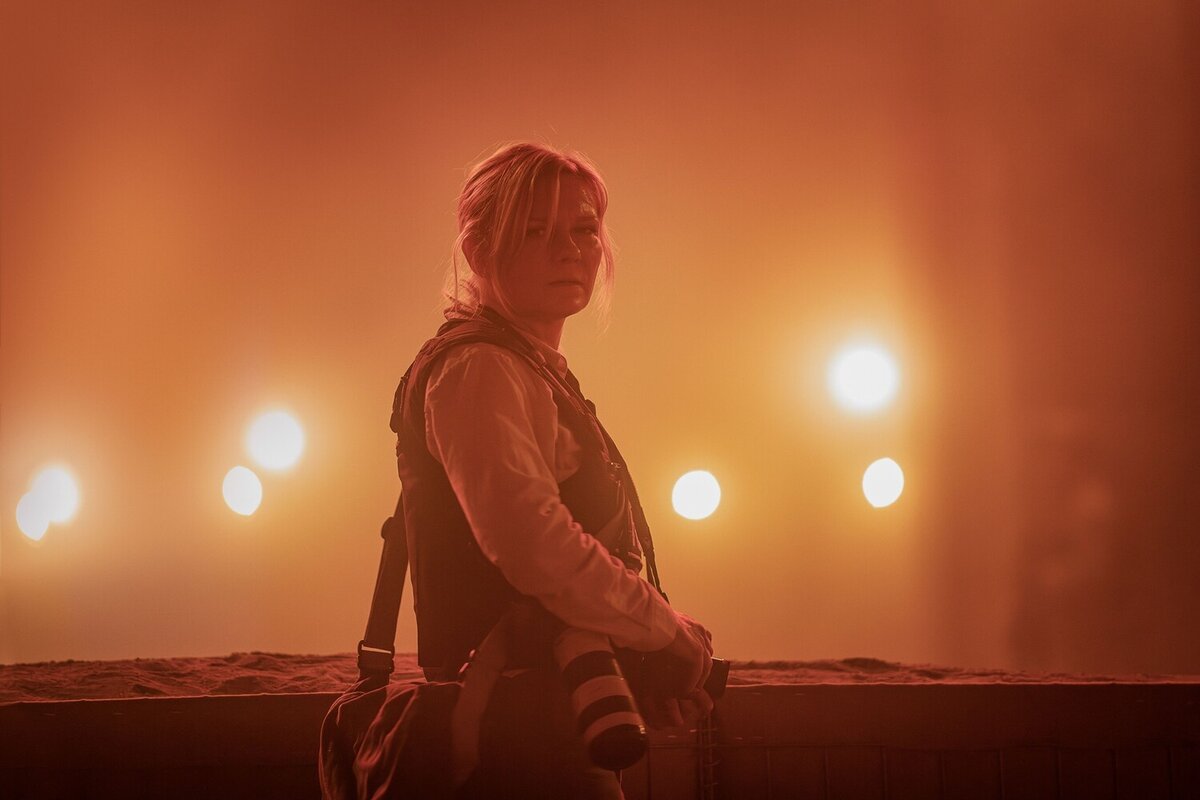«Civil War» - Movie Review by Kinoafisha

The most expensive project by A24, which promised a lot during the marketing stage but ultimately fell short.
A white shirt, red tie, blue jacket. Dressed in the colors of the American flag, the President of the still United States stands under the glare of a video camera, almost out of focus. He rehearses his speech: "We are closer than ever to victory." Clearly nervous. He coughs, sounds unsure. Scenes of popular unrest are intercut with this. Aggressive opposition members overturn cars, throw Molotov cocktails, fight. While the president prepares to go on air, soldiers with shields and police with batons guard the Capitol building in Washington. The country's leader addresses his fellow citizens from the television, urging them to overthrow the illegal separatist government, known as the "Western forces," consisting of California and Texas insurgents, as well as another separatist group from Florida.
A reporter with the standard kit of a war journalist (helmet, vest with the inscription "Press," khaki clothing) photographs the president directly from the hotel television screen. Her name is Lee (Kirsten Dunst), and she is a white female photojournalist reminiscent of her namesake Lee Miller. Together with her partner from the Reuters news agency, South American-born reporter Joel (Wagner Moura), they want to head to Washington. There, they will get the president's final interview before he surrenders to the armed forces of the Western Alliance. Lee and Joel are joined by their mutual friend — an elderly African American from the New York Times, Sammy (a darker-than-usual Stephen McKinley Henderson), and a new acquaintance, Jessie (Kaley Spain), a kind of younger version of Lee and her big fan.
"Civil War" was directed by Alex Garland — a British writer, author of the novel "The Beach" and a director primarily known for his work in the science fiction genre ("Ex Machina" and "Annihilation"). However, this time, with the resources of A24, Garland unexpectedly tackled an epic about the USA. At the same time, he used a truly American genre — the road movie, the canons of which were established by Dennis Hopper's "Easy Rider" in 1969. The four characters of "Civil War" also go through their life journey on the road, just as it was in 1951 with the heroes of Jack Kerouac's novel. They themselves embody America with its multinational composition, waving flags, and pride for July 4th — Independence Day. The migration problems of Texas, bordering Mexico, the film's release date in the year of the US presidential elections, and even the intriguing poster with the torch of the Statue of Liberty, on which snipers are located — all these promising contexts, unfortunately, were not fully realized. Garland does not comprehend the nuances of American reality, nor does he encourage the minds of viewers to engage in discussions, whether political or moral-ethical.

The director focuses more on issues of journalistic ethics. Here, the story of the persecution of photographer Kevin Carter for his work "The Vulture and the Little Girl" from the Sudanese famine is remembered. The photo won the Pulitzer Prize, helped raise funds for charitable purposes, but drove the journalist to suicide due to a stream of accusations of inhumanity. He didn't feed, just documented. A similar theme is revealed in "Fall." But at the center of the plot are not just journalists but war correspondents with their adrenaline rush, spoken of by many who have been in the thick of military conflicts, chasing sensation. In the scene where Lee photographs half-dead men on gallows along with those who torture them, she gives her "protege" Jessie (the idea of continuity is one of the main ones in the film) the most important professional advice. "We don't ask questions. We capture on camera what is happening so that other people can ask questions," Lee teaches. It seems that Garland himself chooses the same tactic: simply showing through the movie camera the violence, war, executions, torture. Thus, the director seems to explain why he does not take responsibility for either the cruelty in the frame or the political choice.
At the same time, the film is like an exciting journalistic drama, which keeps the audience in suspense throughout the screen time, shocking with scenes of mass shootings and pits strewn with corpses. But the overall tone of the narrative is balanced by the counterpoint of gunfire to rap and the presence of Lee's (color digital camera footage) and Jessie's (black-and-white film) lenses through which we follow this story. The film features excellent acting performances. Kirsten Dunst plays fatigue, familiar to us from "Melancholia." And Kaley Spain, who recently starred in "Priscilla," turns out to be completely unrecognizable. And Kirsten Dunst's husband, Jesse Plemons, in an almost demonic episodic role as a white racist policeman.

Don't expect Garland's film to be a cinematic version of an alternate future of divided America (we won't even find out how exactly the rebel states united). It's not even a post-apocalyptic version of "Gone with the Wind" about the North and South War. There won't even be a clear anti-war reaction to what is happening in the world today. "Civil War" seems to be just another blockbuster with aspirations for "Apocalypse Now" or "Full Metal Jacket," but both formally and substantively, it falls far short.
